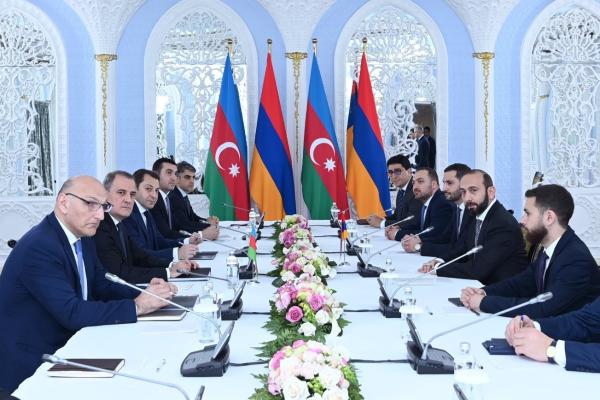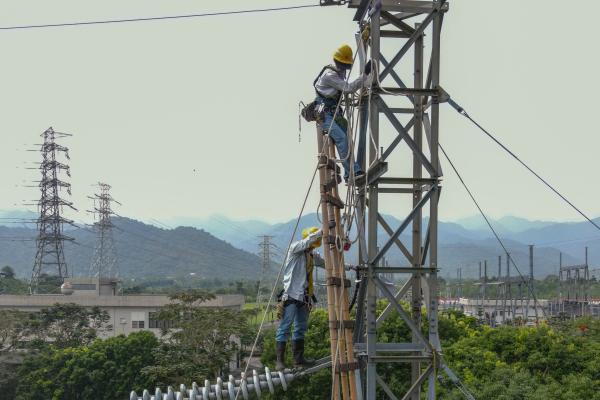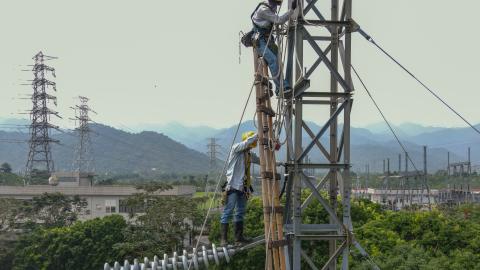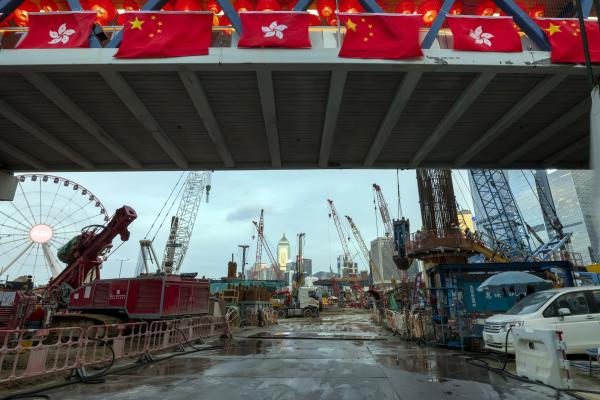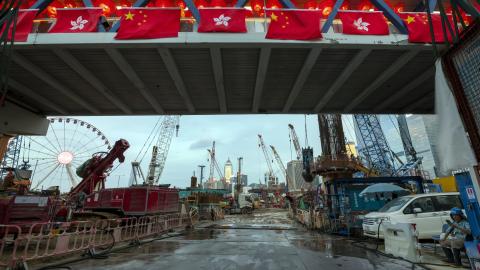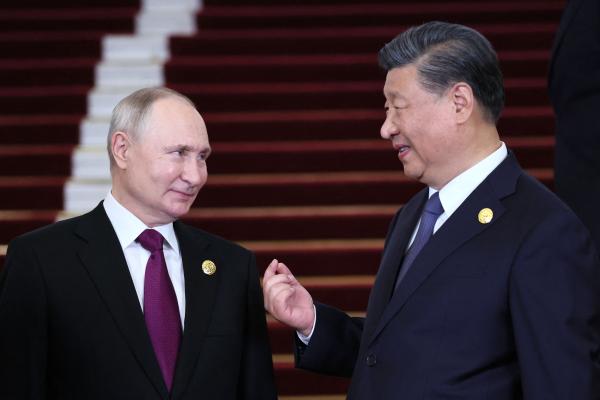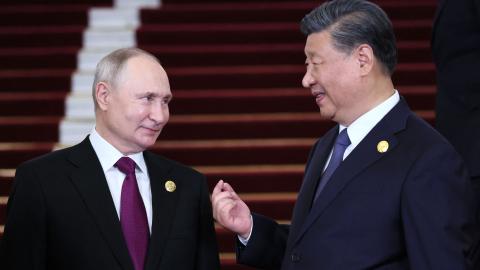 Rebeccah L. Heinrichs
Rebeccah L. HeinrichsSenior Fellow and Director, Keystone Defense Initiative
众议院议长迈克·约翰逊谈对美国主导的世界秩序的威胁
https://www.hudson.org/events/speaker-mike-johnson-threats-us-led-world-order-rebeccah-heinrichs
2024 年 7 月 8 日 现场出席仅限受邀者。咨询:msnow@hudson.org
迈克·约翰逊于 2024 年 6 月 4 日在华盛顿特区举行的新闻发布会上发表讲话。(照片由 Andrew Harnik/Getty Images 拍摄)
迈克·约翰逊迈克·约翰逊
美国众议院议长
heinrichsRebeccah L. Heinrichs
Keystone Defense Initiative 高级研究员兼主任
收听活动音频
对美国和美国主导的国际秩序的威胁日益加剧。中国共产党试图取代美国,因为这个全球霸主正在组建一个经济合作伙伴集团,并迅速建立军事力量来威胁和胁迫美国及其盟友。俄罗斯于 2022 年全面入侵乌克兰,引发了二战以来欧洲最大的陆战。伊朗对以色列发动了前所未有的直接攻击,并资助了针对美国及其盟友的代理攻击。这些独裁国家及其代理人有扩张主义目标,正在合作伤害美国并颠覆其全球影响力。
与众议院议长迈克·约翰逊 (R-LA) 和高级研究员丽贝卡·海因里希斯一起讨论议长的议程,以增强美国威慑的可信度,加强联盟,提高美国的硬实力,维护美国人民的自由、安全和繁荣。
活动记录
此记录是自动生成的,并经过轻微编辑以确保准确性。请原谅任何错误。
约翰·沃尔特斯:
下午好,欢迎来到哈德逊研究所的贝琪和沃利·斯特恩会议中心。我是约翰·沃尔特斯,哈德逊研究所的总裁兼首席执行官。在哈德逊研究所成立 60 多年的时间里,哈德逊研究所接待过许多美国爱国者、军事领导人、立法者、内阁部门负责人和总统,对此我们倍感荣幸。今天,距离我们庆祝美国爱国者诞生的独立日不到一周,我们再次荣幸地接待了这样一位人士:美国众议院议长迈克·约翰逊。议长约翰逊于 2016 年首次当选,代表路易斯安那州第四区,该区包括巴克斯代尔空军基地、空军全球打击司令部总部等重要军事设施。作为一名宪法学者和备受推崇的立法者,他曾担任过重要的国会领导职务,并在司法和武装部队委员会等重要委员会任职。自 10 月就任现任职务以来,议长约翰逊一直是一位杰出的立法领导人。他今天就美国主导的国际秩序所面临的威胁发表讲话可谓恰逢其时。
仅在过去三个月,伊朗就向以色列发射了 300 多架无人机和导弹,为真主党持续袭击以色列北部边境开了绿灯,坦率地说,是为了帮助德黑兰的另一个恐怖代理人哈马斯,伊朗还将其浓缩铀储备扩大到接近核武器级别的水平。在北京,普京和习近平举行会晤,宣布两国伙伴关系进入新时代。在古巴,俄罗斯海军舰艇停靠在哈瓦那港,而中国则迅速扩大了在该岛上的间谍基地。在平壤,俄罗斯和朝鲜之间的军事和经济合作在普京访问后进一步加深。约翰逊议长在解释美国必须与盟友一起对抗这场即将来临的风暴的原因时说:“历史会根据我们的所作所为来评判我们。”本着这种精神,我们期待听到他对美国应如何应对当今威胁并确保美国安全的见解。约翰逊议长发言后,我的同事哈德逊高级研究员丽贝卡·海因里希斯将与他一起继续讨论。现在,请和我一起欢迎迈克·约翰逊议长。
迈克·约翰逊:
非常感谢。很高兴与您在一起。约翰,感谢您的热情介绍。我以前从未有幸在哈德逊研究所发言,但我真的很感激今天上午有这个机会,也非常感谢研究所多年来所做的所有出色工作。正如我们都认识到的那样,现在比以往任何时候都更加重要。上周,我们庆祝了我们作为一个国家的 248 岁生日,如果你像我经常做的那样,对一群高中生或大学生讲话,那似乎是永恒的,但我们都知道,在整个人类历史上,这并不是很长的时间跨度。但我们拥有世界历史上最伟大的国家。它是有史以来最强大、最有权力、最自由、最仁慈的国家,这绝非偶然。因为我们建立在某些原则之上。而我们现在感觉到,我们中的许多人强烈地感觉到,其中一些原则、一些基本真理正受到攻击
甚至在我们自己的边界内,甚至在我们自己的国家内。
在我们即将迎来 250 周年纪念之际,我们正在讨论美国在世界上未来的地位,我们值得花一点时间,特别是在这样的时刻,反思我们作为一个国家曾经在哪里,现在在哪里,未来在哪里。在第二次世界大战前夕,我们知道主要威胁来自欧洲的暴君,但我们受到了亚洲暴君的攻击,我们被迫在两个战场上开战。当然,在冷战中,苏联是美国唯一真正的威胁,但他们在世界各地都有代理人,他们一起合作。三国同盟建立了一个权力轴心,旨在摧毁西方。华沙条约组织建立了一个苏联伙伴集团,与美国对抗。在这两个例子中,我们都看到一群敌人联合起来对抗我们。
今天,我们不再像苏联那样面临一个主要敌人,而且到目前为止,值得庆幸的是,我们还没有看到一种新的三国同盟,但我们确实看到一群国家公开结盟对抗美国。这是一个相互关联的威胁网络。我称之为中国主导的轴心,由俄罗斯、伊朗、朝鲜、委内瑞拉甚至古巴的伙伴政权组成。现在他们各自都有自己的文化和自己特定的险恶目标,但他们每天早上醒来都在思考如何打倒美国。他们越来越多地利用他们的集体军事、技术和财政资源来相互支持,以各种方式切断我们的贸易路线,窃取我们的技术,伤害我们的军队,颠覆我们的经济。
伊朗与俄罗斯合作生产 Shahed 无人机,每天追捕和轰炸乌克兰人,而俄罗斯则利用中国提供的技术向乌克兰电网发射朝鲜导弹。中国是我们最大的威胁,它正在世界各地进行恶意影响行动,甚至现在还与古巴和委内瑞拉支持的卡特尔合作,用芬太尼毒害美国人。中国、俄罗斯和伊朗都与古巴情报机构合作,以美国人为目标,为过境恐怖分子提供安全港。所有这些在我们半球活动的敌人都在这样做,他们与委内瑞拉进行石油贸易,委内瑞拉正将非法移民和暴力罪犯推向我们的边境。
我曾到世界各地访问国会,与世界许多国家的大使和外交部长交谈,我们知道现在战争是全球许多人的心头之念。有些威胁令人毛骨悚然地想起了过去。我们听到消灭犹太人的呼声。我们听到领土扩张的呼声和以种族为主导的入侵理由。我们还听到关于吞并太平洋岛屿的演讲。所有这些都是 80 年前我们听到的一些同样声音的回响。直到最近,在苏联解体近 40 年的时间里,由于美国的以实力求和平政策,战争的声音,相互关联的全球冲突,大多是沉默的。但现在情况已不再如此。在当前的情况下,世界越来越不稳定,我们现在正处于一个决定性的时刻,我想我们所有人都意识到了这一点。
我们在美国采取的行动将继续决定自由世界的道路。从这个意义上说,自由在世界各地得以生存。我们所有人都认识到,虽然民主并不完美,但自治的负担肯定比暴政的枷锁要轻得多。但现在,如果没有美国的领导,我们所看到的未来可能会被共产主义和暴政所定义,而不是自由、机会和安全。在欧洲,普京已经明确表示,他的计划不会止步于乌克兰。他把自己比作沙皇彼得大帝,你可以读到他关于恢复俄罗斯帝国的文章,这个帝国将包括我们在维尔纽斯、赫尔辛基和华沙的军事伙伴。习近平明确表示,他有意扩大共产主义立足点,包括南海。在中东,阿亚图拉想要复活哈里发并消灭以色列。
他们大声说出这些话。随着敌对情绪的加剧,我们冒着失去印度洋-太平洋和红海自由航行的风险,当然,如果我们失去台湾的半导体供应或与欧洲的贸易减少,我们也会面临毁灭性的经济损失。与此同时,我们有可能回到一个由酋长控制耶路撒冷、犹太人没有土地的时代。现在,你听到很多对共和党的批评,作为共和党的领导人,我们确信这些威胁已经增长了一段时间,但在软弱的总统领导下,它们被允许相当戏剧性地扩散。作为共和党人、保守派,我们直言不讳,因为这令人担忧。我们必须直言不讳
我们必须说实话,这些都是客观事实。在奥巴马政府执政期间,我们看到了八年的国际道歉之旅。我们看到了军队的削减、ISIS 的壮大、俄罗斯入侵克里米亚、中国在全球的影响力蔓延,以及一项让伊朗得到他们想要的一切的核协议。
我们今天面临的是什么?我们在奥巴马执政期间看到的同样失败也发生在乔·拜登执政期间,因为他授权了一个与现实脱节的外交政策机构,该机构的议程与我们现在需要的议程截然不同。他们的议程再次是安抚、道歉和迁就。乔·拜登并不把中国当敌人。他停止支持以色列,并与伊朗拉拢,以重启失败的核协议。在最令人费解的政策中,他向间谍和恐怖分子敞开了我们的边境,同时减少了对在我们后院制造混乱的拉丁独裁者的制裁。而这一切的结果是完全可以预见的,我们都在经历着。奥巴马的软弱引发了侵略,而拜登的软弱助长了这种侵略,这是我们自二战以来从未见过的。当我在唐纳德·特朗普第一届政府期间于 2017 年进入国会时,情况有所不同,我们同时来到华盛顿,大约一年半后,即 2019 年,我当选为共和党研究委员会主席。
那是国会中最大的党团会议。作为共和党研究委员会主席,我做的第一件事就是成立了一个国家安全工作组。我们发布了一份报告,其中包含 130 项政策建议,以采取一些非常重要的措施,对抗中国,遏制俄罗斯,并推进美国在中东的利益。令那些想把他描绘成孤立主义者的专家们懊恼的是,如果你看看历史上的客观事实,你就会知道特朗普总统建立了稳固的安全态势,推进了我们在报告中概述的相同原则。还记得他如何用“世界从未见过的烈火与怒火”威胁朝鲜吗?我会模仿特朗普这样做,但今天早上我不会为你这么做。他自己说出来会更好。还记得他是如何干掉苏莱曼尼和巴格达迪的吗?还记得他是第一位向乌克兰发射标枪导弹的总统,以及他是如何采取措施重建我们的军队的吗?
还记得特朗普的军备控制方法有多简单吗?他结束了单方面条约,他指责俄罗斯违反了《中导条约》,他确保美国正在开发武器以在受到挑战时获胜。他指出了对中国的威胁,并承担了中国不公平的贸易行为。他让我们的盟友支付他们应得的份额。他对伊朗实施了石油制裁,并促成了《亚伯拉罕协议》。外交政策机构对此非常讨厌。但他没有退缩,也没有道歉。他让我们的敌人心生恐惧,并以他的领导力明确表示,美国的力量对二十一世纪的和平至关重要。可以肯定的是,共和党不是国家建设者或粗心大意的干涉主义者。我们不认为我们应该成为世界警察,也不是认为我们可以安抚暴君的理想主义者。我们是现实主义者。我们不寻求战斗,但我们知道我们必须做好准备。我们必须做好战斗的准备。如果必须战斗,我们会不惜一切代价。今天,当我们的对手不需要跨越海洋来伤害我们的人民时,我们需要一项以实力实现二十一世纪和平的新政策。
即使美国最后的官僚在乔·拜登的领导下重新掌权并招致敌人的侵略,在未来几个月里,我们有机会改变路线。我认为你会看到美国人民中出现了一股民意。我认为人们本能地认识到了这一点,而且势头在我们这边。我越来越乐观了。我非常希望我们能够做到这一点。当我们做到了这一点,我认为我们需要为未来制定一个由三部分组成的外交政策战略。
首先,我们必须加强我们的国内地位,因为国家安全显然始于国内。这是一个令人不安的事实,但我们最大的国家安全挑战是我们的国债。这是五角大楼领导人在宣誓时所说的,我们都知道这一点。为了满足我们的国防需求,国会必须努力发展我们的经济,大幅削减我们的总体支出。我可以向你们保证,到 2025 年,支出改革将成为我们新共和党多数派的首要任务,这不是一场轻松的对话。但它们对我们的长期生存至关重要。国会必须优先考虑我们国家真正必要的需求,而我们的国家安全必须放在首位。
与此同时,我们必须解决国防基础设施空心化的问题。2024 年军事实力指数是我所知道的许多人都想知道的。
你们在座的各位可能都熟悉这份报告。报告将陆军和海军陆战队的能力评为薄弱,将海军的能力评为非常薄弱,将空军的战备能力评为非常薄弱,将我们的核能力评为边缘。这不是一份好的成绩单。如果我们要对我们的对手展示可信的威慑力,我们必须在财政负责的同时进行重建。这就是为什么我们在 4 月份的国家安全补充法案中投资了 230 亿美元来补充基本武器并重建我们的国防能力。
展望未来,我们还必须重新投资我们的海事部门,开始建造新船和新造船厂。全球 80% 的贸易是通过海洋进行的,而中国目前的造船能力是美国的 232 倍——多 232 倍。我们需要重新上岸并安全上岸我们的供应链,恢复我们的国内制造和建设能力,同时保护我们的军队免受另一次预算紧缩的影响。
但加强我们的国内地位也意味着释放我们的能源部门并保护我们的边境。再次强调,这是关于优先事项的问题。当乔·拜登加入《巴黎气候协定》并停止液化天然气出口时,你知道谁赢了吗?中国和俄罗斯赢了,美国家庭输了。当乔·拜登开放我们的边境,结束留在墨西哥的政策,停止修建隔离墙,并实行抓捕和释放制度时,恐怖分子、卡特尔组织和芬太尼贩运者赢了,美国人输了。
但这是充满希望的部分。2025 年,随着共和党领导的政府迅速加强我们的国内地位,我们还必须利用我们的经济实力来影响我们的朋友并威慑我们的敌人。我们可以做到这一点。我们必须这样做。随着最近的国家安全补充法案,众议院共和党人推翻了拜登政府对伊朗的绥靖政策,并确保了近十年来最严厉的伊朗制裁方案。我们利用我们的经济影响力对抗中共控制的 TikTok,并通过了《回购法案》,该法案允许我们扣押俄罗斯寡头的银行资产以支付对乌克兰的援助。在乌克兰补充法案中,我们要求欧洲盟友提供成本匹配。顺便说一句,这些是参议院版本法案中没有的关键条款。我们在众议院添加了这些条款。我们希望在未来的日子里,我们可以推动我们的欧洲朋友建立一个自给自足的国防工业基地,减少对美国援助的依赖。如果我们做所有这些事情,俄罗斯将无法压倒我们的集体力量。
但由于目前中国对全球和平构成了最大的威胁,国会必须集中精力,用我们掌握的一切手段来对抗中国。在这届国会剩下的短暂时间里,我们已经忙得不可开交了。众议院将对一系列法案进行投票,授权下一届政府在第一天打击我们敌人的经济。我们将制定制裁方案,惩罚向俄罗斯和伊朗提供物质支持的中国军事公司,我们将考虑限制对华对外投资的方案。我们正在制定一项立法,以推动今年秋天实现这一目标。
我们将对《生物安全法案》进行投票,该法案将停止与受制于对手并危及美国人医疗数据的生物技术公司签订的联邦合同。我们将限制任何受 301 条款贸易执法关税约束的商品的最低限度特权,这将有助于阻止中国利用美国贸易的企图。我们的目标是在今年年底前在本届国会上签署一项重要的与中国相关的立法方案,其中包括这些优先事项和许多其他优先事项,我们将积极努力实现这一方案。我非常希望其中大部分内容能够得到两党的认可。在下一届国会中,我们将保持众议院中共威胁特别委员会的地位并继续其重要工作。
北京是我们最大的外国威胁。他们利用我们金融和经济体系的每一个角落。正如你所知,特别委员会在揭露中共的危险性方面发挥了重要作用。显然,我们需要加强国内地位,需要使用所有可用的经济工具,但我们也必须加强我们的联盟。毫无疑问,我们不需要更多天真、理想主义的自封的外交政策专家,他们把其他国家的需求置于我们自己的需求之上。我们需要一个由美国领导、美国优先的联盟,以促进美国人的安全利益,并在国外与国内工薪家庭和企业的利益打交道,一个对每个人都有利的联盟。
本周,华盛顿将主办第 75 届北约峰会,并将庆祝北约带来的和平与繁荣。此后不久,我将在国会大厦与北约领导人发表讲话,但现在,我只想说这些,我将向他们传达这一信息。关于
当然,公众会为北约所取得的和平与繁荣而欢呼,我们将继续与我们的伙伴站在一起,防止不必要的战争。
但我们也认为北约需要做得更多。每个北约成员国都需要将其国内生产总值的至少 2% 用于国防。这是协议,这是交易。其中有 10 或 12 个还没有这样做。并非所有北约成员国都已履行其当前承诺,这种情况已不可接受。甚至可能需要更接近冷战时期的水平。但如果我们都想享受和平与繁荣的未来,我们都需要参与其中。我认为这是一个非常常识的观念。本周我会见北约代表团时,我将向他们每个人提出这个非常严重的问题。
在中东,我们看到民主党分裂对我们与以色列的历史联盟造成的毁灭性影响。因为拜登总统不会这样做,所以到了 11 月,我们将明确表示我们坚定支持以色列,并将在《亚伯拉罕协议》的基础上继续努力,让犹太人民能够在自己的祖国享受安全和自由。
同样,在印度-太平洋地区,美国必须继续加强与印度、台湾、韩国、澳大利亚、菲律宾、越南和英国的军事和经济关系。我们都对该地区有战略利益,有了强大的统一战线,我们就可以保护我们的贸易路线、我们的航道和我们所有的共同利益。
最后,我要提醒你们几件事。所有这些、我今天谈到的一切以及我们知道需要发生的一切都涉及选择。我们可以选择领导,也可以选择成为通往奴役之路的减速带。衰落永远是一种选择。我们生活在一个自由的国家,我们应该做出正确的选择。西方曾一度面临法西斯和帝国主义的消灭,犹太人面临纳粹的种族灭绝。在另一个时刻,我们面临苏联的毁灭。
今天,我们再次受到中国共产党、俄罗斯寡头和伊斯兰恐怖分子的威胁。我们可以选择忽视他们,我们可以试图安抚他们。我们可以听从反对者的意见,他们说我们的价值观不值得捍卫,我们不可能取得胜利。或者我们可以选择另一条道路。我们可以再次以曾经贯穿美国每条血管的坚韧和战斗精神作出回应。我们可以重新武装、重建、重振、恢复和重新让敌人感到恐惧。我们可以重新夺回尊重的顶峰,从而看到和平、繁荣和安全的景象。我们可以表现出勇气,我们可以表现出英勇,我们可以让我们的孙辈有机会成长,而不是在暴政的阴影下,而是在我们自己山顶上闪亮的城市之上。衰落永远是一种选择。这不是共和党人近期会做出的选择。
50 年前,在离我们现在坐的地方几个街区远的一个宴会厅里,罗纳德·里根在保守党政治行动会议的第一次会议上发表了讲话。那几乎就是整整 50 年前。当时,保守主义被许多人认为是一种过时且被否定的哲学。但罗纳德·里根并不这么认为。相反,他提醒我们为什么美国是例外。他提醒我们,我们可以成为山巅之城,对整个世界如此重要。
这就是他在演讲结束时著名的总结。我曾经有这个——当我还在上高中的时候——我把这个打印出来,贴在打字机后面的一个小公告板上。我年纪很大了。这是他说的话。他说:“我们无法逃避我们的命运,也不应该试图逃避。自由世界的领导权是在两个世纪前在费城的那个小厅里强加给我们的。”第二次世界大战后,美国的经济实力和实力是阻止世界重回黑暗时代的唯一力量,教皇庇护十二世曾这样说过:“美国人民拥有伟大的天赋,他们做出了杰出而无私的行动。上帝把受苦受难的人类的命运交到了美国手中。”里根说:“我们确实是,而且今天我们是人类在地球上最后的希望。”感谢上帝的恩典,我们将永远如此。感谢您的时间。
丽贝卡·海因里希斯:
议长先生,感谢您的发言。我们很荣幸在哈德逊研究所接待您。我们感谢您的领导,感谢您的团队与我们的团队一起为实现这一目标所做的出色工作。所以感谢您的到来。
议长先生,这是您领导众议院通过修订的国家安全补充法案以来首次发表国家安全演讲。那么,当你离开华盛顿,回到家乡,去其他选区时,美国人民的反应如何?
迈克·约翰逊:
反应非常积极。我说,在后面的房间里,约翰和我正在交谈,我说:“我的工作人员一直在跟踪这件事,但当发言人不在会议时,
我们将在全国各地为我们的现任总统和我们招募的候选人竞选。” 在过去的六个月里,我已经在 31 个州的 136 个城市举办了活动。自投票以来,在每一次活动中都有人来找我,这些人群规模庞大,形式多样。我们现在看到的人口结构变化是我一生中从未见过的。例如,我们有创纪录数量的西班牙裔和拉丁裔选民加入共和党,我们有创纪录数量的犹太社区,犹太社区非常热情地加入,因为他们觉得拜登抛弃了以色列,事实也确实如此。黑人选民和非裔美国人选民的数量也创下了历史新高。这些都是规模庞大、形式多样的人群,人们都说同样的话:“我们很高兴这件事已经完成。”他们明白我们在世界上确实有自己的角色。我认为人们认真对待普京的愿望,人们明白,如果他能拿下基辅,他就不会停下来。在我看来,他是一个残酷的独裁者。
我认为研究这些问题的人都明白这一点,而且大家一致认为,他不会止步于基辅,而是会在波兰和波罗的海国家的边境驻军,然后我们就会陷入北约的境地,可能需要我们自己的军队去保卫这些边境,防止入侵。这是一个非常非常严重的时刻。今天早上,我想是今天早上基辅一家婴儿医院发生了爆炸。我的意思是,他们很残忍,他们现在正在考验我们的决心。我认为如果我们失败了,我真的相信这对我们国家来说是一个丘吉尔或张伯伦时刻。我认为我们做了正确的事情,我认为历史会记录下来。
丽贝卡·海因里希斯:
我将回到乌克兰和俄罗斯的具体问题上。但我确实想了解一下——我听到外面有很多噪音,我们邀请了第一位客人来这里,所以我要把她的想法带到这里,谈谈……
迈克·约翰逊:
就像众议院共和党会议一样,……
丽贝卡·海因里希斯:
你一直是真正领先的声音,美国需要真正提供道义、外交和军事支持,如有必要,为以色列抵御各种伊朗代理人的努力提供支持。为什么以色列的安全对美国如此重要?
迈克·约翰逊:
嗯,有很多原因。我的意思是,显然它是中东唯一稳定的民主国家,但他们是我们非常重要的合作伙伴和盟友,符合我们自己的利益和关切。我的意思是,在反恐方面,以及我们与他们结盟所带来的经济利益,以及各方面的安全方面。对很多美国人来说,这也是一个信仰问题。我的意思是,《创世纪》开篇就写到,我们与以色列站在一起,并祝福以色列。所以你可以问很多美国人,如果你对 100 名支持以色列的人进行民意调查,他们会给你 100 个不同的理由。我认为这些理由都??很重要。
在这种情况下,对我们来说同样重要的是,我们会非常现实地看待这个问题,如果伊朗和以色列的敌人能够消灭以色列,他们就会将注意力从耶路撒冷转移到华盛顿。他们恨我们几乎和恨以色列一样多。所以这是一种伙伴关系。过去,我花了很多时间与内塔尼亚胡总理在一起,当然自从我成为议长以来。几年前,当我们在以色列参加 AIPAC 之行时,他说:“我们能够站起来的唯一原因是,我们的敌人知道美国是我们的老大哥,站在我们身后,守护着我们。”我们明白这一点的重要性,也明白维持地缘政治稳定的重要性,没有稳定的以色列,我们就无法做到这一点。
Rebeccah Heinrichs:
先生,您提到,中国、俄罗斯、伊朗、朝鲜等各种独裁国家日益结盟,它们都想破坏美国在世界上的影响力和稳定。但您是否认为,由于中国最有能力造成最大的伤害,我们就应该把重点放在亚洲地区,而不要考虑中东和欧洲?
Mike Johnson:
我们负担不起。我的意思是,我们没有资源参与全球事务,也不应该这样做,但中国和俄罗斯正在联手试图给我们一个错误的选择。我们是参与亚洲地区、中东还是欧洲,因为周围到处都是对抗?所有这些国家都在联手,并炫耀这一点。他们试图考验我们的决心,因为他们知道,唯一能阻止他们暴虐统治整个地球的是美国的力量,就像里根 50 年前所说的那样。坦率地说,他们认为我们现在很虚弱,因为他们看到了椭圆形办公室投射出的虚弱。
这对我们来说是一个非常非常危险的情况。
现在,我在过去几周的采访中迅速指出,我尽可能多地直视镜头,我鼓励你们所有人在你们拥有的每个环境和影响范围内都这样做,并提醒我们的敌人,不要认为这对你们来说是一个机会,无论我们现任总司令周围有什么戏剧性事件,美国军队装备精良,随时准备发动袭击。我们将捍卫我们的利益。我认为我们必须非常大胆地发表这一声明,确保他们了解国会和这个国家其他人的决心,不要惹我们。但中国、俄罗斯现在已经与所有媒体庆祝的达成了重大协议。伊朗正在加入,朝鲜不想被排除在外。我的意思是,这是一个由中国领导的轴心,我认为如果我们低估它,我们会对我们的事业造成巨大损害。
Rebeccah Heinrichs:
因此,在这一点上,我注意到特朗普政府仍然将俄罗斯视为严重威胁,美国必须应对的同等对手威胁。拜登政府似乎也想像奥巴马政府那样将战略重心转向亚洲。但是,您提到俄罗斯继续威胁波罗的海国家和波兰,所以您是否认真对待普京的说法,即如果他在乌克兰的行动不被阻止,他将继续向北约推进?
Mike Johnson:
我认为这确实令人担忧。现在,乌克兰冲突、乌克兰战争带来的唯一好处是,我们已经表明,普京在发动战争的能力方面被高估了。据估计,他们在冲突中损失了超过 50 万俄罗斯士兵。他们显然已经损失了大量资产、装备和弹药。因此,从某种意义上说,参与那里的行动对我们的长期利益非常有益,因为在这个过程中,俄罗斯正在被削弱。但他已经将经济调整为战时经济。从各方面来看,他可能会继续这样做很长一段时间,我认为这是非常严重的。
他用自己的话说,他渴望再次拥有伟大的沙皇帝国。我认为,如果他有能力,而他又没有威慑力,我认为他会这样做。我认为大多数认真研究这个问题的人都认为这是一个真正的严重威胁。所以我认为不能低估它。我认为我们必须同时关注中国、俄罗斯、伊朗、朝鲜、委内瑞拉、古巴。我们可以,我们必须非常聪明,我们必须通过实力来投射和平。如果我们不回到里根主义,我们将陷入严重的麻烦。
Rebeccah Heinrichs:
正如您所提到的,北约本周将访问美国。Hudson 有幸成为协助接待他们的智库之一。您如何看待北约在当今的作用?有人说它已经过时了。您对此有何看法?
Mike Johnson:
它已经达到了目的。它在很大程度上有助于遏制战争和冲突并维护和平。从历史上看,这是一个非常重要的组织,具有巨大的潜力。但与此同时,我们必须注意到,所有参与者的参与率肯定已经过时。我的意思是,如果你承诺要花费 GDP 的 2%,你就必须这样做。正如我之前在评论中提到的,可以说可能需要更多。现在,我们几乎处于冷战时期的水平,因此可能需要做出更大的贡献,但我认为维持这一点非常重要,我们支持它。
我们庆祝其成就,但我想说,成员国需要重新树立承诺感,其他国家也渴望成为其中的一部分,但我们必须确保进入该机制需要支付入场费。不是每个人都能搭美国便车。唐纳德·特朗普说得和其他人一样直白。我们要求其他国家尽自己的一份力量是正确和公平的。我认为人们已经收到了这一信息。我们很高兴看到更多国家参与其中,但我们在这方面还有很多工作要做,我们将努力鼓励这样做。
丽贝卡·海因里希斯:
先生,我也注意到,在您的新闻稿和讲话中,您总是非常小心地提到那些正在尽自己一份力量的国家,我注意到这些国家正处于危险的前沿。所以你想谈谈波罗的海国家,以及你与他们会面并看到他们遇到的麻烦时观察到的情况?
迈克·约翰逊:
是的。当手榴弹靠近你自己的后院时,它会让你重新感受到优先权和承诺。我的意思是,相比之下,可耻的是,加拿大在过去几天或最近几天宣布他们不会
他们不会付钱。他们不会尽到 2% 的责任。为什么?他们搭美国的便车。他们在我们的边境上很安全,不用担心这一点。我认为这很可耻。我认为,如果你要成为成员国和参与者,你就需要尽自己的一份力量。有些人显然对此有更大的紧迫感,因为威胁是他们自己的后门。但现实是:如果我们不在那里阻止它,它就会来到这里。没有任何保证。我们生活在这种错误的假设或错误的安全感中,认为我们永远不会在自己的海岸上发生战争。
但猜猜怎么了?敌人来了。边境已经敞开了三年半。据估计,有 1600 万非法移民越境,他们并不都是好人。1 月 3 日,我带领有史以来最大的国会代表团前往边境。我们去了伊格尔帕斯,即南德克萨斯州的德尔里奥地区,当时是震中。他们告诉我们,边境和海关人员告诉我们,仅在德尔里奥地区,非法越境者中估计有 70% 是 18 至 49 岁之间的单身成年男性。他们不是成群结队逃离迫害的家庭。他们不是在寻求庇护。这些人是怀着不良意图来到这里。到今年年底,预计两年内试图非法越境的中国民族主义者人数将增加 23%——2,300,对不起——2,300%。增加 2,300%。
如果你是一名适龄的成年男性,你就不能离开中国,然后就去美国旅行。我的意思是,中共参与了这件事。我们知道恐怖分子监视名单上有恐怖分子,嫌疑恐怖分子已被逮捕,根据上次统计,有超过 250 人。但有多少人完全没有躲避就通过了边境?我的意思是,ISIS 战士就在这里。我的意思是,他们现在全副武装,你已经看过视频了。所以这不再是发生在那边的事情了。它可能就在这里发生。你知道,联邦调查局局长现在在国会山多次作证说,所有的红灯都在闪烁。雷局长,他指的是,我们很可能在美国各地都设立了恐怖分子窝点,我们不知道他们在策划什么,也不知道什么时候策划的,这会让每个美国人都感到震惊,我们应该要求关闭边境。
Rebeccah Heinrichs:
那么你刚刚回答了我的下一个问题,即将边境安全与这个针对这些独裁者的最大危险时代联系起来,它们是相关的。这不是国内问题与外交问题。
Mike Johnson:
再次强调,国家安全始于国内。如果你自己的边境都不能保障安全,那么谈论威慑是毫无意义的。顺便说一句,乔·拜登从上任第一天就开始发布所有行政命令。我的意思是,上任第一天,他们就开始取消特朗普总统实施的所有安全措施。我们弹劾了马约卡斯部长。我的意思是,这是历史性的事件。这是一项绝望的措施,因为危急时刻需要它。当然,参议院没有同意,但我认为他是美国历史上最糟糕的内阁部长,因为我们将面对他们策划的灾难。他们策划了开放边境。我们将在未来几十年内应对这一问题。特朗普总统说:“我们希望启动历史上最大规模的驱逐行动。”这是必要的。我们需要找到所有这些危险的人。
罪犯,他们清空了中美洲的监狱,把他们送到了边境。是的,但问题就在这里。你知道,我们无法找到所有这些人,因为国土安全部没有追踪他们的下落。这是完全颠覆性的,是反美的,是反移民的,因为遵守法律并以正确方式行事的人对此最为不满,这也是你看到选民人口结构变化的原因。所以这件事对我来说非常令人恼火,我曾一对一地问过总统,拜登总统,“总统先生,你为什么要这样做?”他没有答案。这些利益集团鼓励他这样做,他不知道政策是什么,也不知道如何解决。他说他没有权力,这简直是笑话。
丽贝卡·海因里希斯:
回到中国军事侵略日益加剧的问题,哈德逊研究所的学者们也注意到,即使在混合战区,侵略行为也愈演愈烈。中国越来越习惯于对我们的条约盟友菲律宾采取咄咄逼人的行动,实际上这是在威胁台湾。您能谈谈您的观点吗?美国人应该如何理解台湾保持安全的重要性?
迈克·约翰逊:
我
不为别的,就一个词,半导体。你喜欢你的电器吗?你用手机吗?你需要电子产品吗?如果中国占领台湾,想象一下中国几乎掌控着世界上所有的半导体生产,并控制着通过这部分海外贸易的贸易路线。这是一个难以想象的前景。所以我们捍卫人民的自由,我们支持自由。台湾这个国家值得捍卫,因为它有各种优点,但它也直接符合我们的经济利益,我们的稳定利益。想想你的沟通方式。想想你当地医院的所有设备,成像设备。现在,经济稳定和健康所需的一切都与半导体生产有关。所以如果这只是纯粹的私利,那么每个美国人都应该参与其中。我们必须确保这种情况不会发生。
Rebeccah Heinrichs:
这让我想知道,你谈到共和党是如何现实主义的。我们必须保持清醒的头脑,但先生,您也非常雄辩地谈到了自由原则和美国的立场,尤其是与我们的对手形成鲜明对比。美国应该在支持中国、朝鲜、伊朗和俄罗斯等国家的异见团体、支持自由的团体和受迫害的宗教团体方面发挥什么作用?
迈克·约翰逊:
好吧,在这方面,我们的外交努力和我们对宗教自由的倡导确实非常重要。《权利法案》中列出的第一项自由是宗教自由。建国者们明白,如果剥夺了一个民族的宗教自由,他们的政治自由很快就会随之而去,这一点你在历史上已经看到了。我们捍卫良知的权利,这是我们拥有的最基本的自由,即信仰和采取行动的权利,这对我们作为美国人至关重要。我经常谈论我所说的美国保守主义的七项核心原则,但它们实际上是美国本身的七项核心原则。我认为它关乎个人自由、有限政府、法治、以实力求和平、财政责任、自由市场和人类尊严。我们相信,正如我们在刚刚庆祝 7 月 4 日的宣言中大胆宣称的那样,这是一个不言而喻的真理。
杰斐逊在将其交给富兰克林和亚当斯编辑之前撰写的原始草稿是,他说它是神圣而不可否认的,“我们认为这些真理是神圣的、不可否认的,或者不言而喻的。”显而易见的是,我们都是被创造出来的。我们生来不平等,我们生来平等,上帝赋予我们权利,而不是政府。这是开创美国并让我们走上成为有史以来最强大国家之路的革命性宣言。我和许多议员一样在深夜参观——我不再这样做了。在我成为议长之前我曾经这样做过——但我会深夜带领团队进入众议院会议厅,向他们展示众议院会议厅周围所有很酷的东西,所有的象征意义。顺便说一下,很多都是宗教性的。我们有“我们信仰上帝”。如你所知,这句话就写在演讲台上方的大金字上。
我总是指出这一点,并说:“你知道这句话是什么时候放在那里的吗?为什么?翻到你的赞美诗集第 14 页。”当你来到众议院议事厅,人民之家时,有一份访客指南。你翻到第 14 页,在页面的中间部分,它非常清楚地写着:“哦,你会看到,‘我们信仰上帝’,在演讲台上方。”1963 年,国会把我安排在那里,因为当时正值冷战的开始。它说这是对当时苏联哲学的谴责。马克思主义的前提是没有创造者。没有上帝。因此它导致了错误的假设。
我们捍卫自由、捍卫个人尊严、捍卫每个人可贵的尊严和价值的原因在于,我们的建国先驱相信,而且我们大多数人仍然相信,我们是按照上帝的形象造出来的。因此,每个人都有可贵的价值。这是值得为之奋斗的。这就是我们作为一个国家的定义。如果我们失去了这一点,我们就失去了成为美国人的基本要素。
Rebeccah Heinrichs:
议长先生,我们的时间不多了,但我确实想回到俄罗斯和乌克兰的话题上,因为您也确实站出来支持乌克兰的基督徒。您能谈谈吗,因为我觉得有时我们有点……我们可能会感到困惑,也许是因为外面有很多虚假信息,情况令人困惑。乌克兰基督徒的状况如何,俄罗斯的独裁主义和对乌克兰的侵略对他们造成了怎样的伤害?
Mike Johnson:
他们是被专门针对的。我曾多次与那里的宗教领袖和牧师会面。我所在的教派,南方浸信会的一些传教士也在那里。很多神职人员都担心自己的家人会受到伤害。
不为别的,就一个词,半导体。你喜欢你的电器吗?你用手机吗?你需要电子产品吗?如果中国占领台湾,想象一下中国几乎掌控着世界上所有的半导体生产,并控制着通过这部分海外贸易的贸易路线。这是一个难以想象的前景。所以我们捍卫人民的自由,我们支持自由。台湾这个国家值得捍卫,因为它有各种优点,但它也直接符合我们的经济利益,我们的稳定利益。想想你的沟通方式。想想你当地医院的所有设备,成像设备。现在,经济稳定和健康所需的一切都与半导体生产有关。所以如果这只是纯粹的私利,那么每个美国人都应该参与其中。我们必须确保这种情况不会发生。
Rebeccah Heinrichs:
这让我想知道,你谈到共和党是如何现实主义的。我们必须保持清醒的头脑,但先生,您也非常雄辩地谈到了自由原则和美国的立场,尤其是与我们的对手形成鲜明对比。美国应该在支持中国、朝鲜、伊朗和俄罗斯等国家的异见团体、支持自由的团体和受迫害的宗教团体方面发挥什么作用?
迈克·约翰逊:
好吧,在这方面,我们的外交努力和我们对宗教自由的倡导确实非常重要。《权利法案》中列出的第一项自由是宗教自由。建国者们明白,如果剥夺了一个民族的宗教自由,他们的政治自由很快就会随之而去,这一点你在历史上已经看到了。我们捍卫良知的权利,这是我们拥有的最基本的自由,即信仰和采取行动的权利,这对我们作为美国人至关重要。我经常谈论我所说的美国保守主义的七项核心原则,但它们实际上是美国本身的七项核心原则。我认为它关乎个人自由、有限政府、法治、以实力求和平、财政责任、自由市场和人类尊严。我们相信,正如我们在刚刚庆祝 7 月 4 日的宣言中大胆宣称的那样,这是一个不言而喻的真理。
杰斐逊在将其交给富兰克林和亚当斯编辑之前撰写的原始草稿是,他说它是神圣而不可否认的,“我们认为这些真理是神圣的、不可否认的,或者不言而喻的。”显而易见的是,我们都是被创造出来的。我们生来不平等,我们生来平等,上帝赋予我们权利,而不是政府。这是开创美国并让我们走上成为有史以来最强大国家之路的革命性宣言。我和许多议员一样在深夜参观——我不再这样做了。在我成为议长之前我曾经这样做过——但我会深夜带领团队进入众议院会议厅,向他们展示众议院会议厅周围所有很酷的东西,所有的象征意义。顺便说一下,很多都是宗教性的。我们有“我们信仰上帝”。如你所知,这句话就写在演讲台上方的大金字上。
我总是指出这一点,并说:“你知道这句话是什么时候放在那里的吗?为什么?翻到你的赞美诗集第 14 页。”当你来到众议院议事厅,人民之家时,有一份访客指南。你翻到第 14 页,在页面的中间部分,它非常清楚地写着:“哦,你会看到,‘我们信仰上帝’,在演讲台上方。”1963 年,国会把我安排在那里,因为当时正值冷战的开始。它说这是对当时苏联哲学的谴责。马克思主义的前提是没有创造者。没有上帝。因此它导致了错误的假设。
我们捍卫自由、捍卫个人尊严、捍卫每个人可贵的尊严和价值的原因在于,我们的建国先驱相信,而且我们大多数人仍然相信,我们是按照上帝的形象造出来的。因此,每个人都有可贵的价值。这是值得为之奋斗的。这就是我们作为一个国家的定义。如果我们失去了这一点,我们就失去了成为美国人的基本要素。
Rebeccah Heinrichs:
议长先生,我们的时间不多了,但我确实想回到俄罗斯和乌克兰的话题上,因为您也确实站出来支持乌克兰的基督徒。您能谈谈吗,因为我觉得有时我们有点……我们可能会感到困惑,也许是因为外面有很多虚假信息,情况令人困惑。乌克兰基督徒的状况如何,俄罗斯的独裁主义和对乌克兰的侵略对他们造成了怎样的伤害?
Mike Johnson:
他们是被专门针对的。我曾多次与那里的宗教领袖和牧师会面。我所在的教派,南方浸信会的一些传教士也在那里。很多神职人员都担心自己的家人会受到伤害。
其中一些人已成为攻击目标。我见过一些例子和照片,一些家庭因为是基督徒而被火箭弹击中,他们所在的公寓楼位于五楼。我之前提到过,维护宗教自由的重要性在于,如果你能……共产党总是这样做,他们首先攻击基督徒。
他们以基督徒为目标。为什么?因为他们相信他们应该效忠于比政府、比国家更高的权力。所以你必须消灭它。然后只是出于……在我看来,这是一种邪恶的东西,但他们瞄准有这种信仰的人,他们想消灭它。这是邪恶和卑鄙的,它恰恰表明了普京和他的政权的所作所为。我认为这是一件值得强调的重要事情。我不认为这是应该被低估的事情。
Rebeccah Heinrichs:
最后一个问题。我们谈到了您所在地区如何设立全球打击司令部,而我的重点领域是确保美国拥有强大的核威慑力量,能够可靠地威慑中国、俄罗斯和任何其他核威胁。我们在这里接待了布西尔将军。先生,您有什么想说的吗?确保我们拥有可靠、强大的军队,尤其是核威慑力量的重要性?
迈克·约翰逊:
是的。最后说一句很好。上周四,我们把我的大儿子送到海军学院。他是一名海军中校,现在正在经历新生暑期。所以为杰克祈祷吧。他们对孩子们很粗暴,但是是的。但我们昨晚接到了第一个家庭电话,因为他们给了他们 30 分钟的时间打电话回家,为期七周。所以我们焦急地等待着。昨天下午 12:30,全家人都围在身边,我们打开免提电话,问他:“杰克,你能用 FaceTime 通话吗?”“不行,爸爸,我们站在体育馆里。我周围还有 1100 名新生。我们相距三英尺,必须把手机拿在这里。”而且非常非常严格。我告诉你,当我们送他去参加新生入学日时,他们称之为入学日,如果你从未去过所有新生入学的学院,那会让你感到自豪。
只要国旗飘扬,国歌响起,所有这些真正聪明的孩子都在那里服务,他们有一颗仆人的心,他们想为国家服务,他们的家人都在那里欢呼。如果你对国家有信心,这会让你爱上它。我强烈建议你参加其中一次这样的活动。但强大军队的重要性、核威慑的重要性可以说从未如此重要,至少自第二次世界大战以来如此。冷战很重要,但我们再次强调,我们主要关注的是一个敌人。这是多方面的,也是危险的。随着技术和其他能力的进步……我们听说俄罗斯人想在卫星上安装核弹。这是更高层次的事情。所以我们不能认为这是理所当然的。
现在,我们在开支和武器方面都落后于中国,我们必须认真对待。里根提醒我们,“自由不是血统继承的。”必须为之奋斗。必须捍卫、保护,传给下一代,否则我们的子孙后代将无法享受它。所以我们都需要在某个方面参与其中。其中一部分是我们的投资。作为一个国家,我们必须明白这有多重要。因此,我们将为此而倡导,我们将利用我们拥有的每一个影响范围。我知道你们所有人也会这样做。我希望你们能向我们的美国同胞解释,我们不能将这种自由视为理所当然。我们在这里没有发生过冲突,但我们不会发生冲突并非不可避免。所以我们必须做好准备。这就是为什么这项工作如此重要。哈德逊研究所的奖学金和工作非常重要。真的非常感谢它,我认为它现在比以往任何时候都更重要。
Rebeccah Heinrichs:
先生,我们感谢杰克的服务,我们感谢您的领导和您所做的工作。请和我一起感谢众议院议长。
相关事件
查看更多
2024 年 7 月 30 日
虚拟活动 |仅限在线
与大使 Elchin Amirbayov 讨论美阿关系
特邀发言人:
大使 Elchin Amirbayov
Luke Coffey
Michael Doran
2024 年 5 月 10 日,阿塞拜疆外交部长 Jeyhun Bayramov 和亚美尼亚外交部长 Ararat Mirzoyan 在哈萨克斯坦阿拉木图。(照片由阿塞拜疆外交部/Handout/Anadolu 通过 Getty Images 提供)
2024 年 5 月 10 日,阿塞拜疆外交部长 Jeyhun Bayramov 和亚美尼亚外交部长 Ararat Mirzoyan 在哈萨克斯坦阿拉木图。 (图片来源:阿塞拜疆外交部/Handout/Anadolu via Getty Images)
Speaker Mike Johnson on the Threats to the US-Led World Order
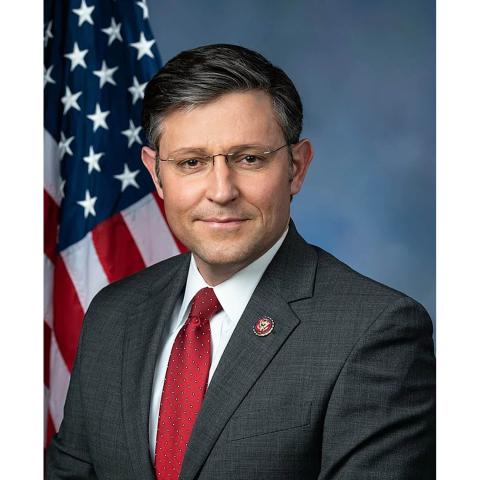 Mike Johnson
Mike JohnsonSpeaker of the United States House of Representatives
 Rebeccah L. Heinrichs
Rebeccah L. HeinrichsSenior Fellow and Director, Keystone Defense Initiative
The threats to the United States and the US-led international order are growing increasingly hostile. The Chinese Communist Party seeks to supplant the United States as the preeminent global power is forming an economic bloc of partners and quickly building its up military to threaten and coerce the US and its allies. Russia initiated the largest land war in Europe since World War II with its full-scale invasion of Ukraine in 2022. Iran launched an unprecedented direct attack against Israel and is funding proxy attacks against the United States and its allies. These authoritarian countries, and their proxies, have expansionist goals and are collaborating to harm the United States and subvert its global influence.
Join Speaker of the House Mike Johnson (R-LA) and Senior Fellow Rebeccah Heinrichs for a discussion about the speaker’s agenda to bolster the credibility of US deterrence, strengthen alliances, improve America’s hard power, and maintain freedom, security, and prosperity for the American people.
Event Transcript
This transcription is automatically generated and edited lightly for accuracy. Please excuse any errors.
John Walters:
Good afternoon and welcome to the Betsy and Wally Stern Conference Center here at Hudson Institute. I am John Walters, Hudson’s president and CEO. In its more than 60 years, Hudson has been honored by hosting a number of American patriots, military leaders, legislators, cabinet department heads, and presidents. Today, less than a week after our celebration of Independence Day, the day that created American patriots, we are honored to again host such an individual: the speaker of the United States House of Representatives, Mike Johnson. First elected in 2016, Speaker Johnson represents the Fourth District of Louisiana, a district that includes critical military installations such as Barksdale Air Force Base, headquarters of the Air Force Global Strike Command. A constitutional law scholar and highly regarded legislature, he has held key congressional leadership positions, and served on critical committees including judiciary and armed services committees. Since assuming his current position in October, Speaker Johnson has been an exceptional legislative leader. His remarks today on the threats to the US-led international order could not be more timely.
In the last three months alone, Iran has fired over 300 drones and missiles toward Israel, gave a green light to Hezbollah’s ongoing attacks on Israel’s northern border, frankly, to aid Tehran’s other terrorist proxy, Hamas, and Iran has expanded its enriched uranium stockpile to near nuclear grade for weapons. In Beijing, Putin and Xi met to declare a new era in their partnership. And Cuba, Russian Naval ships docked in Havana Harbor while China has rapidly expanded its spy base on that island. And in Pyongyang, military and economic cooperation between Russia and North Korea deepened in the wake of Putin’s visit. And explaining why the US must join with our allies against the gathering storm, Speaker Johnson said, “History judges us by what we do.” It is in that spirit that we look forward to hearing his insights on what the US should do to meet today’s threats and ensure the security of America. Following his remarks, Speaker Johnson will be joined by my colleague, Hudson Senior Fellow Rebeccah Heinrichs, to continue the discussion. But now please join me in welcoming Speaker Mike Johnson.
Mike Johnson:
Thank you so much. It’s so great to be with you. John, thank you for the kind introduction. I have never had the honor of speaking at the Hudson Institute before, but I’m really grateful for the opportunity this morning, and really thankful for all the good work the institute’s done over the years. It’s never been more important than it is right now, as we all recognize. Last week we celebrated our 248th birthday as a nation, and if you’re speaking to a group of high school or college students, as I often do, that seems like an eternity, but we all know that’s not a long span of time in a whole scale of human history. But we have the greatest nation in the history of the world. It’s the strongest, most powerful, most free, most benevolent of any nation that has ever been, and that’s no accident. It’s because we’re built on certain principles. And we feel right now, many of us feel acutely that some of those principles, some of those foundational truths are under assault even within our own boundaries, even within our own country.
And as we near our 250th anniversary, and we debate the future of America’s position in the world, it is worth us just taking a moment, especially on an occasion like this, to reflect upon where we’ve been and where we are and where we’re going as a country. In the lead up to World War II, we understood the primary threat to come from a tyrant in Europe, but we were attacked by a tyrant in Asia, and we were forced into war in two theaters. In the Cold War, of course, the Soviets were the only real threat to the US, but they had a block of proxies around the world and they worked together. The Tripartite Pact established an axis of power, set on undoing the West. And the Warsaw Pact established a block of Soviet partners set against America. In both of those instances, we saw a group of enemies joining forces against us.
Today, we don’t face one primary enemy as we did in the Soviet Union, and so far, thankfully we don’t see a new kind of Tripartite Pact, but we do see a group of nations openly aligned against the United States. It’s an interconnected web of threats. I refer to it as a China-led axis, composed of partner regimes in Russia, Iran, North Korea, Venezuela, and even Cuba. Now they each have their own cultures and their own specific sinister aims, but they all wake up every morning thinking how they can take down America. And they’re increasingly using their collective military, technological, and financial resources to empower one another in their various efforts to cut off our trade routes, and steal our technology, and harm our troops, and upend our economy.
Iran works with Russia to produce Shahed drones to hunt down and bomb Ukrainians every day, while Russia launches North Korean missiles at Ukraine’s electrical grids using technology provided by the Chinese. China, our single greatest threat, is engaging in malign influence operations around the world, and is even working with cartels now, backed by Cuba and Venezuela, to poison Americans with fentanyl. China, Russia, and Iran all work with Cuban intelligence outposts to target Americans and provide safe harbor for terrorists in transit. And all these enemies operating in our hemisphere, they’re doing this and they’re trading oil with Venezuela, which is pushing illegal aliens and violent criminals towards our borders.
I’ve been around the world on congressional trips, and talk to ambassadors and foreign ministers in many countries around the world, and we know right now war is on the minds of many around the globe. And some of the threats are eerily reminiscent of the past. We hear chants of elimination of the Jewish people. We hear calls for territorial expansion and ethno-driven justifications for invasion. And we hear speeches about the annexation of Pacific Islands. And all of these are echoes of some of the same things we heard 80 years ago. Until recently, in the almost 40 years since the collapse of the Soviet Union, thanks to America’s policy of peace through strength, those sounds of war, the interconnected global conflict, had mostly been silent. But that is no longer the case. And under the current path, the world is increasingly destabilized, and we are living now in a fateful moment, and I think all of us recognize it.
Our actions here in America will continue to determine the path of the free world. And in that sense, there’s survival of liberty around the world. All of us here recognize that while democracy is not perfect, the burden of self-government is certainly far lighter than the yoke of tyranny. But right now, absent American leadership, we’re looking at a future that could be well-defined by communism and tyranny, rather than liberty and opportunity and security. In Europe, Putin has made it clear that his plans don’t stop with Ukraine. He’s likened himself to Tsar Peter the Great, and you can read his essay about restoring the Russian Empire, an empire that would include our military partners in Vilnius, Helsinki, and Warsaw. Xi Jinping made abundantly clear he’s interested in expanding his communist footholds, including in the South China Sea. In the Middle East, the Ayatollah wants to resurrect the caliphate and eliminate Israel.
They say these things out loud. And with their rising hostilities, we risk the loss of free navigation in the Indo-Pacific and the Red Sea, and we risk devastating economic harm, of course, if we lose access to semiconductors in Taiwan or have reduced trade with Europe. At the same time, we risk returning to an era where sheiks control Jerusalem and the Jewish people have no land to call their own. Now, you hear a lot of criticism about Republicans, and as a leader in the Republican Party, we’re sure these threats have been growing for some time, but under weak presidents, they’ve been allowed to metastasize rather dramatically. As Republicans, conservatives, we call this out, because it’s alarming. We have to speak bluntly and we have to tell the truth. These are objective facts. During the Obama administration, we saw eight years of international apology tours. We saw the sequestration of our military, the buildup of ISIS, Russia’s invasion in the Crimea, the spread of maligned Chinese influence around the globe, and a nuclear deal that gave Iran everything they wanted.
And what are we facing today? The same failures we saw under Obama have happened under Joe Biden, because he’s empowered an out-of-touch foreign policy establishment who has an agenda very different than the one that we need right now. Their agenda is about, once again, appeasing and apologizing and accommodating. Joe Biden doesn’t treat China like an enemy. He’s stopped supporting Israel, and has cozied up to Iran to revive the failed nuclear deal. And in the most inexplicable policy imaginable, he’s opened our borders wide to spies and terrorists, while reducing sanctions on Latin dictators who wreak havoc in our backyard. And the results of this were completely foreseeable, and we’re all living through it. Obama’s weakness invited aggression, and Biden’s weakness has fueled that aggression like nothing we’ve seen since World War II. Things were different when I came to Congress during the first administration of Donald Trump, 2017, we came to Washington at the same time, and I was elected chairman of the Republican Study Committee about a year and a half later, in 2019.
That was the largest caucus in Congress. And one of the first things I did as chairman of RSC was to create a national security task force. We published a report with 130 policy recommendations to do some very important things, to counter China, to deter Russia, and to advance American interest in the Middle East. And to the chagrin of the pundits who want to paint him as an isolationist, if you look at the objective facts in the history, you know President Trump established a solid security posture that advanced the same principles that we outlined in our report. Remember how he threatened North Korea with “Fire and fury, the likes of which the world has never seen?” I would do it in my Trump impression, but I won’t do that for you this morning. It’s better when he said it. Remember how he took out Soleimani and al-Baghdadi? Remember how he was the first president to send Javelin missiles to Ukraine, and how he took steps to rebuild our military?
Remember how simple Trump’s approach to arms control was? He ended one-sided treaties, he called out Russia for violating the INF Treaty, and he ensured America was developing the weaponry to win if challenged. He called out the threat to China, and he took on their unfair trade practices. He got our allies to pay their fair share. He enforced oil sanctions on Iran, and he brokered the Abraham Accords. And the foreign policy establishment absolutely hated it. But he did not retreat, and he did not apologize. He instilled fear in our enemies, and with his leadership made clear that American strength is essential to a peaceful twenty-first century. And to be sure, the Republican Party is not one of nation builders or careless interventionists. We don’t believe we should be the world’s policeman, nor are we idealists who think we can placate tyrants. We are realists. We don’t seek out a fight, but we know we have to be prepared. We have to be prepared to fight. And if we must fight, we fight with the gloves off. And today, when our adversaries don’t need to cross oceans to harm our people, we need a new policy of peace through strength for the twenty-first century.
Even as the America-last bureaucrats regained power under Joe Biden and invited aggression from our enemies, in the coming months, we have a chance to change course. I think you’re seeing a groundswell among the American people. I think people recognize this intuitively and the momentum is on our side. I’m increasingly optimistic. I’m very hopeful that we’re going to be able to do this. And when we do, there’s basically a three-part foreign policy strategy that I think we need to pursue for the future.
First, we have to strengthen our domestic position because national security begins at home, obviously. It’s an uncomfortable truth, but our biggest national security challenge is our national debt. That’s what the leaders of the Pentagon say when you put them under oath, and we all know that. To meet our defense needs, Congress has to work to grow our economy and significantly reduce our overall spending. And I can promise you that come 2025, spending reform will be a top priority for our new Republican majority, and they’re not going to be easy conversations. But they’re essential for our long-term survival. Congress has to prioritize the truly essential needs of our nation and our national security has to be at the top of that list.
At the same time, we must address the hollowing out of our defense infrastructure. The 2024 Index of Military Strength is something I know many of you are familiar with in this room. It ranks the Army’s and the Marine Corps’ capacity as weak, the Navy’s capacity as very weak, the Air Force’s readiness as very weak, and our nuclear capabilities as marginal. That is not a good report card. And if we’re going to present a credible deterrent to our adversaries, we have to rebuild while we are also being fiscally responsible. That’s why we invested $23 billion to restock essential weapons and rebuild our defense capacities in the April National Security Supplemental Bill.
Looking ahead, we also have to reinvest in our maritime sector and begin building new ships and new shipyards. Eighty percent of global trade is conducted over the oceans, and China currently has a 232 time shipbuilding capacity over the United States—232 times more. We need to reshore and safe-shore our supply chains, and restore our domestic manufacturing and building capabilities, while safeguarding our military from another sequestration.
But strengthening our domestic position also means unleashing our energy sector and protecting our borders. Again, it’s about priorities. When Joe Biden joined the Paris Climate Accords and stopped LNG exports, you know who won? China and Russia won, and American families lost. As Joe Biden opened our borders and ended Remain in Mexico, and stopped building the wall, and instituted catch and release, it was the terrorists and the cartels and the fentanyl traffickers that won, and Americans who lost.
But here’s the hopeful part. In 2025, as a Republican-led government works quickly to strengthen our domestic position, we must also use our economic might to influence our friends and deter our enemies. We can do this. We must do this. And with the recent National Security Supplemental, House Republicans pushed back on the Biden administration’s policy of Iran appeasement and secured the toughest Iran sanctions package in nearly a decade. We leveraged our economic influence against CCP-controlled TikTok, and we passed the REPO Act that allows us to seize Russian oligarchs’ bank assets to pay for assistance in Ukraine. And in the Ukraine Supplemental, we mandated cost matching for European allies. By the way, those are key provisions that were not in the Senate version of the legislation. We added that in the House. We’re hopeful that in the days ahead, we can push our friends in Europe to establish a self-sufficient defense industrial base that is less reliant on American assistance. Russia will not be able to outweigh our collective strength if we do all this.
But because, at this moment, China poses the greatest threat to global peace, Congress must keep our focus on countering China with every tool at our disposal. In the short time remaining in this Congress, we’re busy at this already. The House will be voting on a series of bills to empower the next administration to hit our enemies’ economies on day one. We’ll build our sanctions package, punish the Chinese military firms that provide material support to Russia and Iran, and we’ll consider options to restrict outbound investments in China. We’re working on a piece of legislation to move this fall to do that very thing.
We will vote on the BIOSECURE Act, which will halt federal contracts with biotech companies that are beholden to adversaries and endanger Americans healthcare data. We’ll rein in the de minimis privilege for any good subject to Section 301 trade enforcement tariffs, and that will help stymie China’s attempts to exploit American trade. Our goal is to have a significant package of China-related legislation signed into law by the end of this year in this Congress featuring these priorities and many more, and we’ll work aggressively toward that package. I’m very hopeful that much of this can be bipartisan. And in the next Congress, we’ll maintain the status and continue the important work of our House Select Committee on the Chinese Communist Party Threat.
Beijing is our number one foreign threat. They exploit every nook and cranny in our financial and economic systems. And the Select Committee has been very instrumental, as you know, in exposing the dangers of the CCP. It’s clear we need to strengthen our domestic position and we need to use all the economic tools available to us, but we must also strengthen our alliances. Make no mistake, we don’t need more naive, idealistic self-proclaimed foreign policy experts who put the wants of other countries before the needs of our own. We need a US-led, America-first coalition that advances the security interest of Americans and engages abroad with the interests of working families and businesses here at home, a coalition that’s good for everybody.
This week, Washington is hosting the seventy-fifth NATO summit and will celebrate peace and prosperity that NATO has brought. And I’ll be speaking to the NATO heads at the capitol shortly after this, but for now, I just want to say this, and I’ll deliver the message to them emphatically. Republicans, of course, celebrate the peace and prosperity that NATO has secured, and we’ll continue to stand by our partners as we prevent needless wars.
But we also believe that NATO needs to be doing more. Every NATO member needs to be spending at least 2 percent of their GDP on defense. That’s the agreement, that’s the deal. There’s 10 or 12 of them that aren’t doing that yet. It’s no longer acceptable that not all NATO members have reached their current commitment. It may even need to be closer to levels during the Cold War. But if we’re all going to enjoy a future of peace and prosperity, we all need to have skin in the game. And I think that’s a very commonsense notion. As I meet with NATO delegations this week, I’m going to raise this very serious issue with each one of them.
In the Middle East, we’re seeing the devastating effects of Democrats splintering on our historic alliance with Israel. Because President Biden will not do it, come November, we will be clear about our steadfast support for Israel and we’ll build upon the Abraham Accords so the Jewish people can enjoy safety and freedom in their homeland.
Likewise, in the Indo-Pacific, America must continue to build upon our military and economic relationships with India, Taiwan, South Korea, Australia, the Philippines, Vietnam, and the United Kingdom. We all have strategic interest in the region, and with a strong united front, we can protect our trade routes, our shipping lanes, and all of our shared interests.
I’m going to wrap all this up by reminding you of a couple of things. All this, everything that I’ve talked about today and everything that we know needs to happen involves choices. We can choose to lead or we can choose to be a speed bump down the road to serfdom. Decline is always a choice. We live in a free country and we ought to make the right choice. At one point, the West was facing elimination by fascists and imperialists, and the Jews were facing genocide by the Nazis. At another point, we faced annihilation by the Soviets.
Today, we are threatened again by Chinese Communists, by Russian oligarchs, and Islamic terrorists. We can choose to ignore them, we can try to appease them. We can listen to the naysayers who say our values aren’t worth defending and that there can be no victory. Or we can choose another course. We can respond again with all the fortitude and fight that once ran through every American vein. We can rearm, rebuild, reinvigorate, restore, and reinstate fear in our enemies. We can retake the summit of respect and thus look out on a landscape of peace and prosperity and security. We can show courage, we can show valor, and we can give our grandchildren the chance to grow up not in the shadow of tyranny, but atop our own shining city on a hill. Decline is always a choice. That is not a choice that Republicans will be making anytime soon.
50 years ago at a banquet hall, a few blocks from where we’re sitting, Ronald Reagan spoke at the very first meeting of the Conservative Political Action Conference. It was almost exactly 50 years ago. At the time, conservatism was considered by many to be an out-of-date and discredited philosophy. But Ronald Reagan didn’t buy that. Instead, he reminded us all why America is exceptional. He reminded us that we can be that shining city on a hill and so important to the entire world.
And this is how he famously summarized it at the end of that speech. I used to have this—when I was in high school—I had this printed and put on a little bulletin board behind my typewriter when we had them. I’m very old guys. This is what he said. He said, “We cannot escape our destiny, nor should we try to do so. The leadership of the free world was thrust upon us two centuries ago in that little hall in Philadelphia.” In the days following World War II, when the economic strength and power of America was all that stood between the world and the return to the Dark Ages, Pope Pius XII said it this way, “The American people have a great genius for splendid and unselfish actions. Into the hands of America, God has placed the destinies of an afflicted mankind.” Reagan said, “We are indeed and we are today the last best hope of man on earth.” By God’s grace, we will always be. Thanks for your time.
Rebeccah Heinrichs:
Thank you for those remarks, Mr. Speaker. We are privileged to host you here at Hudson Institute. We thank you for your leadership and for your team’s great work with our team to make this happen. So thanks for being here.
Mr. Speaker, this is your first national security address since you led the House to pass that amended National Security Supplemental. So as you’ve gone outside of Washington and gone back home and gone to other districts, what has been the response from the American people?
Mike Johnson:
It’s been very favorable. I was saying in the back room over here, John and I were talking, and I said, “My staff keeps track of this, but when the speaker is not in session, we’re expected to be around the country campaigning for our incumbents and our candidates that we recruited.” And I’ve done events in now 136 cities in 31 states in the last six months. And since the vote, I have people come up to me at every one of these events, and these are big, diverse crowds. We are seeing a demographic shift right now in the country that I’ve not seen in my lifetime. We have a record number of Hispanic and Latino voters, for example, coming in the Republican Party, we have a record number of Jewish community, the Jewish communities coming in very enthusiastically because they feel like Biden’s abandoned Israel, and he has. A record number of Black voters, African American voters. And these are big, diverse crowds and people all say the same thing, “We’re so glad that that was done.” They understand that we do have a role to play in the world. And I think people took Putin’s aspirations seriously, that people understand that he would not stop if he could take Kyiv. He’s a ruthless dictator in my view.
And I think people who study these issues understand, and there’s a consensus that he would not stop at Kyiv, but he would set up on the border of Poland, the Baltic states, and then we would be in a NATO situation where there might be a need for our own troops to go and defend those borders against an invasion. It’s a very, very serious time. This morning, there was, I think a bombing at an infant hospital in Kyiv this morning. I mean, they’re ruthless and they’re testing our resolve right now. And I think if we had failed, I really do believe it was a Churchill or Chamberlain moment for our country. I think we did the right thing and I think history’s going to record that.
Rebeccah Heinrichs:
And I’m going to get back to that on specifically in Ukraine and Russia. But I do want to get—I can hear a lot of noise outside and we had that initial guest come in here, and so I’m going to take her idea here and talk . . .
Mike Johnson:
Just like a house Republican conference meeting, there’s . . .
Rebeccah Heinrichs:
You have been a really leading voice on the need for the United States to truly provide moral and diplomatic and military backing if necessary, to provide support to Israel’s efforts to defend itself against the various Iranian proxies. Why is Israel’s security so important to the United States?
Mike Johnson:
Well, for so many reasons. I mean, obviously it’s the only stable democracy in the Middle East, but they’re a very critical partner and ally in us for our own interests and concerns. I mean, in terms of counterterrorism and for the economic benefits we have in our alliance with them, and for security in every way. For a lot of Americans, it’s also a matter of faith. I mean, this is something that’s written in the Book of Genesis in the very beginning of the book that we stand with and bless Israel. So you can ask a lot of Americans, if you polled 100 who were in favor of supporting Israel, they give you 100 different reasons. And I think they’re all important.
What’s also important for us in a setting like this, we’d be very realistic about this, if Iran and the enemies of Israel were able to eliminate Israel as a state, they would then shift their focus from Jerusalem to Washington. They hate us almost as much as they hate Israel. So this is a partnership. I’ve spent a lot of time with Prime Minister Netanyahu over the last, certainly since I became speaker. And when we were in Israel on an AIPAC trip years ago, he said, “The only reason that we’re able to stand is because our enemies know that America is our big brother standing behind us, looking over our shoulder.” And we understand the importance of that and the importance of maintaining that geopolitical stability and we can’t do it without a stable Israel.
Rebeccah Heinrichs:
And sir, you mentioned that there is this growing alignment of China, Russia, Iran, North Korea, various authoritarian countries that all seek the same thing, which is to undermine US influence and stability in the world. But are you of the mind or the school of thought that believes that because China has the most capacity to do the most harm, that we should focus on the Asia geographic region to the exclusion of the Middle East and Europe?
Mike Johnson:
We can’t afford to. I mean, we don’t have the resources to be engaged all around the world and nor should we be, but China and Russia in particular are working together to try to present to us a false choice. Do we engage in the Asia region or the Middle East or in Europe, because there’s confrontation all around? And all of those countries are working together and flaunting it. They’re trying to test our resolve, because they know the only thing standing between their tyrannical overrun of the entire globe is the might of the US just like it was as Reagan said, 50 years ago. And they see us as weakened right now to be frank, because they see weakness projected from the Oval Office. And it’s a very, very dangerous situation for us.
Now, I’ve been quick to point out in interviews I’ve done over the last couple of weeks, and I look right into the camera as often as I can, and I would encourage all you to do the same in every setting and sphere of influence you have and remind our enemies, do not think this is an opportunity for you regardless of the drama surrounding our current commander in chief, the US military is well-equipped and ready to strike at any time. We will defend our interests. And I think we’ve got to be very bold in that assertion and make sure they understand the resolve of Congress and the rest of this country, don’t mess with us. But China, Russia have made their big pact now with all the, celebrated that in the media. Iran is joining in, North Korea doesn’t want to be left out. I mean, it is a China-led axis, and I think we do great damage to our cause if we underestimate it.
Rebeccah Heinrichs:
And so then on that point, I noticed that the Trump administration still viewed Russia as an acute threat, a peer adversary threat that the United States had to contend with. And it seems like the Biden administration also wants to do sort of an Asia pivot like what the Obama administration did. But is your view though, you mentioned about Russia’s continue to threat to the Baltic countries and to Poland, so you take Putin seriously at his word that if he’s not stopped in Ukraine, that he will continue to advance on NATO?
Mike Johnson:
I think it’s a real concern. Now we have, the only good thing that’s come out of the conflict in Ukraine, the war in Ukraine, is that we’ve shown that Putin was overestimated in terms of his ability to prosecute a war. And by some estimates, they’ve lost over a half a million Russian troops in the conflict. And they’ve obviously gone through a lot of their assets and their equipment, their munitions. And so in a certain sense, engaging there has been very helpful for our long-term interests because you’re weakening Russia in the process. But he’s realigned his economy to be a wartime economy. And by all appearances, he could go on for quite some time and I think it’s very serious.
He said it in his own words, he aspires to have the great czar empire again. And I think if he had the ability and he did not have deterrence, I am of the mind that I think he would. And I think most people who study this seriously believe that’s a real serious threat. And so I don’t think it could be underestimated. I think we have to watch China, Russia, Iran, North Korea, Venezuela, Cuba, all of them at the same time. And we can, we have to be very smart and we have to project peace through strength. If we don’t return to the Reagan doctrine, we’re going to be in serious trouble.
Rebeccah Heinrichs:
And as you mentioned, NATO is in town this week. Hudson has the privilege of being one of the think tanks helping to host them. How do you view the role of the alliance today? Some have said it’s outdated. What would you say to that?
Mike Johnson:
Well, it served its purpose. It has largely been helpful in deterring war and conflict and maintaining peace. Historically, it’s been a very important organization and it has tremendous potential. But at the same time, we have to note that what is certainly outdated is the participation rate of everyone who’s involved. I mean, if you make a commitment, you’re going to spend 2 percent of your GDP, you need to do that. And as I noted in my remarks earlier, arguably it may need more needed. Now, we’re almost at the level of the cold war II at this point, and so there might need to be a greater contribution, but I think it’s a very important thing to maintain, and we support it.
We celebrate its accomplishments, but there needs to be a renewed sense of commitment, I would say, on the part of the member nations, and there’s others who aspire to be a part of it, but we’ve got to make sure that there’s an entrance fee to this. Everyone cannot ride along on the coattails of America. And Donald Trump says this as bluntly as anyone. It’s just right and fair for us to demand that others do their part. And I think that message is being received. We’re encouraged to see more nations bringing that to the table, but we’ve got a lot more work to do in that respect, and we’ll be trying to encourage that.
Rebeccah Heinrichs:
Sir, I have noticed too, in your press releases and your remarks, you’re always often very careful to mention the countries who are doing their part, and I’ve noticed those are the ones that are on the front end of where the danger is. So you want to talk a little bit about just the Baltic countries and what you’ve observed from meeting with them and seeing their troubles?
Mike Johnson:
Yeah. When the grenades are close to your own backyard, it gives you a renewed sense of priority and commitment. I mean, by contrast, shamefully, Canada announced in the last few days or the last couple of days that they won’t be ponying up. They’re not going to do their 2 percent. Why? Talk about riding on America’s coattails. They have the safety and security of being on our border and not having to worry about that. I think that’s shameful. I think if you’re going to be a member nation and participant, you need to do your part. Some have a greater sense of urgency about that clearly, because the threat is that their own back door. But here’s the reality: if we don’t stop it there, it will come here. There’s no guarantee. We live under this false assumption or false sense of security that we would never have a war on our own shores.
But guess what? The enemy is here. The border’s been wide open for three and a half years. By some estimates, 16 million illegals have come across, and they’re not all good people. On January 3, I took the largest congressional delegation to the border that had ever been. We went to Eagle Pass, the Del Rio sector in South Texas and at the time, was the epicenter. They told us there, the border and customs agents told us there that at the Del Rio sector alone, an estimated 70, seven- zero, 70 percent of the people who crossed illegally are single adult males between the ages of 18 and 49. These are not huddled masses of families running from persecution. They’re not seeking asylum. These are people coming here with bad designs. By the end of this year, it’s estimated we’ll have a 23 percent increase—2,300, sorry—2,300 percent increase in the number of Chinese nationalists who try to come across that border illegally in two years. A 2,300 percent increase.
You can’t leave China if you’re a military aged adult male and just come take a voyage to the US. I mean, the CCP is involved in this. We know we have terrorists on the terrorist watch list, suspected terrorists who have been apprehended, over 250 of them by last count. But how many came through totally unevaded? I mean, ISIS fighters are here. I mean, they’re coming across in full on fatigues now, you’ve seen the videos. So this is no longer something that’s happening way over there. It’s potentially happening right here. And you know, the FBI director’s testified multiple times now on Capitol Hill that all the red lights are flashing. Director Wray, what he’s talking about is that we’ve got very likely we have terrorist cells set up all around America and we don’t know what they’re plotting or when, and that would alarm every American and we ought to demand that the border be closed.
Rebeccah Heinrichs:
Then you just answered my next question then, which is tying border security with this era of maximum danger against these authoritarians, that they are related. It’s not a domestic issue versus a foreign affairs issue.
Mike Johnson:
Again, national security begins at home. It’s pointless to talk about deterrence if you don’t have your own border secured. And Joe Biden began on day one, by the way, he issued all the executive orders. I mean, the first day in office, they started unwinding all the security measures that President Trump had put in place. We impeached Secretary Mayorkas. I mean, that’s a historic thing. It was a desperate measure because desperate times called for it. The Senate didn’t go along, of course, but I think he’s the single worst cabinet secretary in the history of America because we’ll be dealing with a catastrophe that they engineered. They engineered the open border. We will be dealing with this for decades to come. President Trump has said, “We want to start the largest deportation effort in history.” It’s needed. We need to find all these dangerous people.
Criminals, they’ve emptied out prisons in Central America and sent them all over the border. Yes, but here’s the problem. We will not be able to locate all these people because DHS is not keeping track of their whereabouts, as you know. It is completely subversive and it’s anti-American and it’s anti-immigrant because the people who follow the law and do it the right way are the most upset about this, and that’s why you’re seeing the demographic shift in the electorate as well. So this is the thing to me that is so maddening, and I’ve asked the president about this one-on-one, President Biden, “Mr. President, why would you do this?” He doesn’t have an answer. These are interest groups that encouraged him to do it, and he has no answers to what the policy is or how he could fix it. He says he doesn’t have the authority, which is a joke.
Rebeccah Heinrichs:
Back over to the problem of China’s increasing, really, military aggression and something that we’ve tracked here, the scholars here at Hudson Institute, that the aggression, even in the hybrid warfare zone is getting worse. China is becoming increasingly comfortable acting aggressively against our treaty ally, the Philippines, really being threatening against Taiwan. Can you speak to what is your view, how should Americans understand why it’s important that Taiwan remains safe and secure?
Mike Johnson:
If for no other reason, one word, semiconductors. Do you like your appliances? Do you use your cell phone? Do you need your electronics? If China takes Taiwan, imagine China being in charge of almost all the semiconductor production in the world and controlling the trade routes through that part of overseas trade. It’s an unimaginable prospect. And so we defend freedom of people, we stand for freedom. The nation of Taiwan is important to defend for all of its merits, but it also is directly in our economic interest, our stability interest. Think of your methods of communication. Think of all the equipment at your local hospital, imaging devices. Everything that is necessary for economic stability and health now is tied into semiconductor production. And so if it was just purely selfish interest, every American should be dialed in on this. We have to make sure that doesn’t happen.
Rebeccah Heinrichs:
Which then leads me to wonder, you talked about how the Republican Party is realist. We have to have clear eyes, and yet you also speak very eloquently, sir, about the principles of freedom and what the United States stands for, especially in contrast to our adversaries. What role should the United States take in supporting dissident groups, pro-freedom groups, persecuted religious groups in countries like China, North Korea, Iran, and Russia?
Mike Johnson:
Well, our diplomatic efforts are really important in that regard and our advocacy for religious freedom. The first freedom listed in the Bill of Rights is religious liberty. And the founders understood if religious freedom is taken from a people, their political freedom soon follows, and you’ve seen that throughout history. We defend the right of conscience, the most fundamental freedom that we have as the right to believe and act upon it, and that’s essential to who we are as Americans. I talk a lot about what I call the seven core principles of American conservatism, but they’re really the seven core principles of America itself. I think it’s about individual freedom, limited government, the rule of law, peace through strength, fiscal responsibility, free markets and human dignity. We believe, as we boldly proclaimed in our declaration that we just celebrated July 4, that it’s a self-evident truth.
The original draft that Jefferson wrote before he handed it to Franklin and Adams to edit was he said it was sacred and undeniable, “We hold these truths to be sacred and undeniable, or self-evident.” Something that’s obvious that all of us are created. We’re not born equal, we’re created equal, and God’s the one that gives us our rights, not the government. That is the revolutionary statement that started America and set us on the course to be the most powerful nation ever that there was. I take tours late at night as many members—I don’t do it anymore. I used to before I became speaker—but I take groups into House chamber late at night and show them all the cool things around the House chamber, all the symbolism. A lot of it’s religious by the way. And we have, “In God we trust.” As you know, that’s right there in big gold letters above the speaker’s rostrum.
And I always point that out and I say, “Do you know when that was put there and why? Turn in your hymnal to page 14.” There’s this visitor’s guide when you come to the House chamber, the People’s House. And you open it up to page 14, and it says very clearly about halfway down the page, it says, “Oh, you’ll see, ‘In God we trust,’ above the speakers rostrum.” I was placed there in 1963 by the Congress because it was in the beginning of the Cold War. And it says it was a rebuke to the Soviets’ philosophy in that era. Marxism begins with the premise that there is no creator. There is no God. And so it leads to false assumptions.
The whole thing about why we defend freedom, why we defend the dignity of the individual, the estimable dignity and value of every human is because our founders believed, and most of us still believe that we are made in God’s image. And so every single person has an estimable value. That’s worth fighting for. It’s what defined us as a nation. If we lose that, we lose an essential ingredient about what it means to be an American.
Rebeccah Heinrichs:
Mr. Speaker, we’re running out of time here, but I do then want to turn back on the subject of Russia and Ukraine because you really also have come out in support of the Christians in Ukraine. Can you talk, because I think sometimes we’re little bit . . . we can be confused, maybe because there’s a lot of disinformation out there and it’s just a confusing situation. What is the state of Christians in Ukraine and how Russia’s authoritarianism and aggression against Ukraine is harming them?
Mike Johnson:
They’re targeted specifically. I’ve met multiple times with religious leaders, pastors who are there. Some of my own denomination, Southern Baptist have missionaries there. And a lot of these clergy are in fear for their own families. And some of them have been targeted. I’ve seen examples and photographs of families who were taken out by targeted rockets to their apartment building on level five of an apartment building because they’re Christians. I mentioned earlier, the importance of maintaining religious freedom is if you can . . . and the communists always do this, they go after the Christians first.
They target Christians. Why? Because they believe they owe an allegiance to a power higher than the government, than the state. And so you have to eliminate that. And then just out of just . . . it’s a demonic thing in my view, but they target people who have that belief and they want to stamp it out. And it’s vicious and vile, and it shows exactly what Putin and his regime is all about. And I think it’s an important thing to highlight. And I don’t think it’s something that ought to be underestimated.
Rebeccah Heinrichs:
Last question. We talked about how you’ve got Global Strike Command in your district, and my area of focus is making sure the United States has a robust nuclear deterrent that’s credible to deter both China, Russia, and any other nuclear threat. And we’ve hosted General Bussiere here. So anything you want to say about the importance of just making sure that we have a credible, robust military and especially our nuclear deterrence, sir?
Mike Johnson:
Yes. It’s a good thing to close on. A week ago Thursday, we dropped my oldest son off at the Naval Academy. He’s a midshipman, and he’s going through plebe summer right now. So pray for Jack. They’re rough on the kids, but yeah. But we got our first family phone call last night because they give them 30 minutes to call home for seven weeks when they’re in this thing. So we’re anxiously awaiting it. And it’s 12:30 yesterday afternoon, and the whole family’s around, and we got him on speakerphone, “Jack, can you do FaceTime?” “No, dad, we’re standing in a gym. I have 1100 other plebes around me. We’re three feet apart and we have to hold our phone right here.” And it’s very, very strict. I tell you what, when we dropped him off for induction day, they call it, if you’ve never been to one of the academies for the day where all the freshmen come in, it would make your heart swell with pride.
Just the flags waving and the national anthem and all these really sharp kids that are there to serve and they have servants hearts and they want to serve their country and their families are all there cheering. It’ll make you love your country if you’re down on it. I highly recommend showing up for one of those things. But the importance of a strong military, the importance of nuclear deterrence has arguably never been more important, at least since World War II era. The Cold War was an important thing, but again, we were focused on primarily one enemy. This is multifaceted and it is dangerous. And with the advance of technology and all the other capabilities . . . we heard the Russians wanted to put a nuke on a satellite. This is next level stuff. And so we cannot take this for granted.
We’re being outspent and outgunned by China right now, and we have to take seriously. Reagan reminded us, “Freedom is not inherited in the bloodstream.” It’s got to be fought for. It’s got to be defended, protected, passed along to the next generation or our children and our grandchildren will not enjoy it. So we all need skin in the game in one respect or another. Part of it is our investment. And as a nation, we have to understand how important that is. So we’ll be advocating for that, and we’ll be using every sphere of influence we have. And I know all of you will as well. I hope you will, to explain to our fellow Americans that we cannot take this freedom for granted. We have not had a conflict here, but it’s not inevitable that we won’t. And so we’ve got to be ready for it. And so that’s why this work is so important. The Hudson Institute’s scholarship and work is so important. Truly, truly grateful for it, and I think it’s more important now than it’s ever been.
Rebeccah Heinrichs:
Well, sir, we are thankful for Jack’s service, and we thank you for your leadership and the work that you’ve done. Please join me in thanking the speaker of the House.
